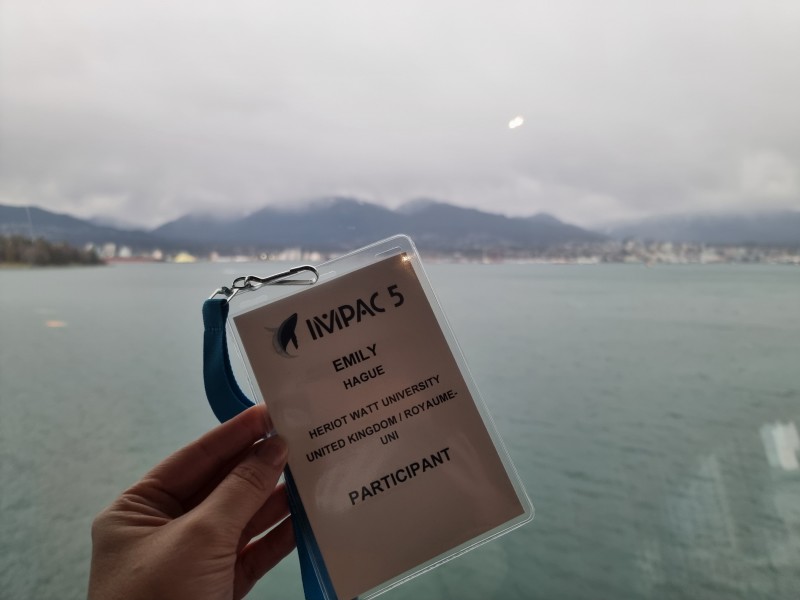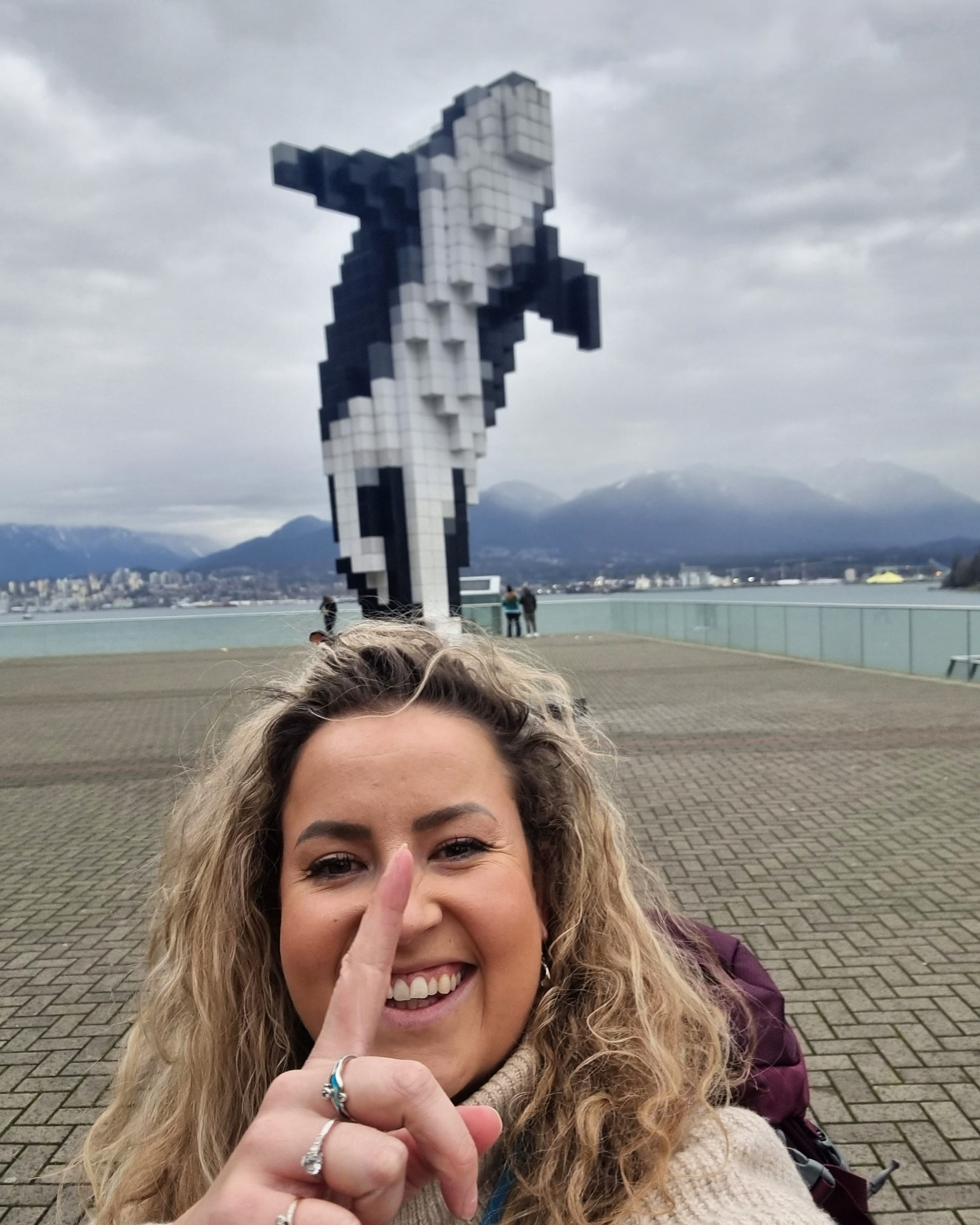International Marine Protected Areas Congress (IMPAC5)
Emily Hague
Heriot-Watt University

My participant pass for the IMPAC5 Congress, taken whilst looking out of the congress venue (Vancouver Convention Centre) over Burrard Inlet and Vancouver Harbour, towards North Vancouver. Fantastic venue and views!
In February 2023, with help from the Challenger Society for Marine Science Travel Award, I travelled almost 5000 miles from Scotland over to Vancouver Canada, to attend the Fifth International Marine Protected Areas Congress (IMPAC5), a global forum that brought together ocean conservation professionals and high-level officials to inform, inspire and act on marine protected areas. During the 6-day congress, I was inspired and moved listening to a variety of incredible keynote speakers, including talks from marine biologists, photographers, videographers, academics and representatives of the indigenous First Nation communities. I also really enjoyed attending the variety of sessions scheduled each day, which included talks and workshops focusing on various themes and topics important to collectively working together to improve ocean protection. Throughout the conference, I took full advantage of the networking opportunities that arose from having 3000 ocean professionals within the same space – and met and connected with many scientists, practitioners and interested parties from a variety of backgrounds and disciplines, who are all working tirelessly towards a common goal of improved ocean protection. During the ‘Managing Marine Protected Areas and Human Activity’ session, I was delighted to have the opportunity to present some of my own PhD research relevant to the congress topic, and presented a talk titled ‘Same species, same space, different practice: reviewing the non-uniformity in assessment of cumulative impacts to marine mammals’. I received great feedback and questions following my talk and am really pleased to have been able to present my UK-based research to an international platform. If you’re interested in this work, you can check out the published paper in Frontiers in Marine Science here https://doi.org/10.3389/fmars.2022.822467
Checking out the Digital Orca, by Douglas Coupland, which is situated right outside the Vancouver Convention Centre.
Following the conference, I then remained in British Columbia (BC) for a further three weeks, to fully utilise the opportunity of being able to meet in-person with like-minded marine researchers based in BC who are working on similar and complementary topics to my own PhD research. I travelled around Vancouver itself to meet with representatives from Ocean Wise, the Port of Vancouver, and SMRU Consulting North America, and then spent the remaining time on Vancouver Island attending preorganised meetings with over 20 researchers across a variety of organisations, including the University of Victoria (UVic), Transport Canada, Ocean Wise, the Department of Fisheries and Oceans, Marine Education Research Society, the Institute of Ocean Sciences, Simon Fraser University and Environment and Climate Change Canada. Alongside some really productive one-on-one meetings where we discussed common research interests and identified future collaborative opportunities, I also gave further talks on my research, providing a 1-hr seminar on my research as part of the Institute of Ocean Sciences seminar series, and also gave a 30-min talk on my current studies to a research lab at UVic. Meeting with such a multitude of organisations and researchers allowed me to simultaneously expand my network of research contacts whilst also introducing them to my own research interests. This allowed for rich discussions on the potential for building future UK-Canada collaborations, and will be invaluable to my career progression post-PhD. I have now returned to my studies in Scotland feeling reinvigorated, and excited and energised to proceed with developing a strong Fellowship application founded on the ideas and new collaborations developed during my time at IMPAC5 and whilst travelling around BC. 
Profile:
I am Emily Hague, a PhD researcher based at Heriot-Watt University, primarily supervised by Dr Lauren McWhinnie. My research focuses on better understanding cumulative impacts to marine mammals, with a focus on UK seas, and I have a special research interest in the impacts of vessels (check out the project I lead: The Scottish Vessel Project).
Latest News
Marine Data Management, Governance and the MEDIN toolset
The Marine Environmental Data and Information Network (MEDIN) and OceanWise are delighted to invite you to attend our popular free online training workshop: ‘Marine Data Management, Governance and the MEDIN toolset’ on the 19th – 23rd of May 2025.
Workshop on the contribution of UK Arctic Ocean science to the International Polar Year 32/33
12:00 11th June – 16:00 12th June 2025: NOC Southampton (In-person with online option): Registration deadline 16th May
REGISTER HERE
Pre-meeting questionnaire (open to all)
The purpose of this workshop is for the UK Ocean Science community to discuss and then draft a prospectus document outlining the priority Arctic research questions the community would like to address during the run up to, throughout and beyond the International Polar Year 32/33. Additionally, to identify what unique strengths and technologies the UK has to help fill these knowledge gaps.
The second day of the workshop will be dedicated to writing groups, one for each of the priority research questions identified - from both the pre-meeting questionnaire (HERE) and day one discussion. By the end of the meeting, each group will have produced draft text and sourced supporting figures for the prospectus.
Post meeting, the draft will be opened for comments and suggestions from everyone, regardless of whether they were able to attend the workshop or not. It will then be shared with UK funders (UKRI, FCDO, DSIT, ARIA) and potential international programmes with whom we would like to collaborate (e.g. Arctic 2050, Norway). It will form a basis from which wider integration with terrestrial, atmospheric and cryosphere communities can be built, e.g. at the UK Arctic Science Meeting in September in Northumbria.
To ensure balanced community and ECR representation, and to ensure that the size of the writing groups is efficient and effective, if the number of registrations from individual institutes becomes overwhelming, we may contact individuals or teams and ask that each institute selects a smaller number of individuals to attend in-person. Please wait for confirmation of in-person attendance before finalising travel arrangements.
The workshop will be open to hybrid attendance and contributions on both days.
Challenger Society Council Position Vacancy
The Challenger Society for Marine Science (CSMS) are pleased to announce an exciting opportunity to support the next generation of ocean scientists and innovators. CSMS are looking for a new Council member to fill the Student Travel Awards and Stepping Stones Portfolio. The successful applicant will administer the travel and research grants available for Early Career Researchers.
The role involves:
- Receiving applications for the two schemes and responding to applicant inquiries
- Soliciting and compiling input from the rest of the Council for assessing the applications
- Communicating with successful and unsuccessful applicants for the two schemes
- Working with the Honorary Treasurer on allocating funds to successful applicants
- Following up with award winners on their reporting requirements
- Attending Council meetings four times a year (in person or online) and contributing to discussions and decision making for CSMS
The usual term for Council members is three years.
For more information about the CSMS Council, please follow this link: https://www.challenger-society.org.uk/The_Council
For more information about our Early Career Researcher grants and awards, please follow this link:
https://www.challenger-society.org.uk/Stepping_Stones
and
https://www.challenger-society.org.uk/Travel_awards
If you are interested in applying or have any questions regarding the role, please contact kathen@bas.ac.uk
